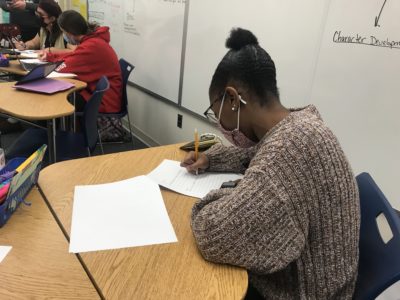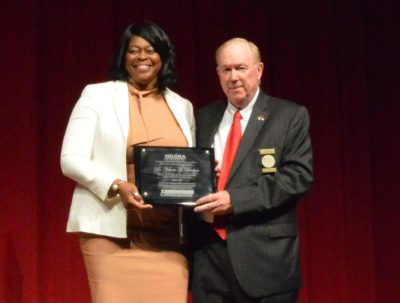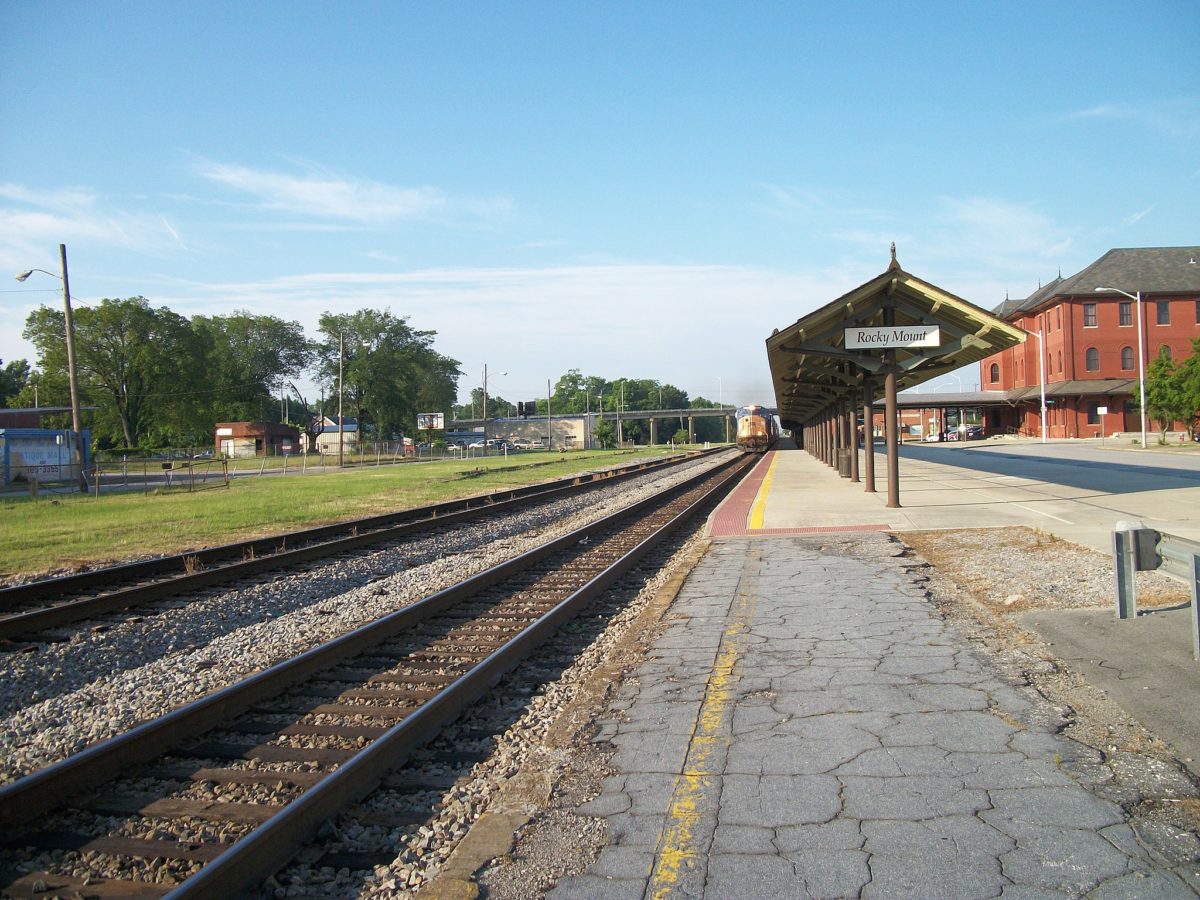
Share this story
- Edgecombe County leaders are exploring a county-line demerger that would send the 1600 to 1700 students who live on the Edgecombe County side of Rocky Mount from Nash County Public Schools to Edgecombe County Public Schools. @ECPSchools_NC @NCPSchools
- “We do the children of east Rocky Mount a disservice if we do not demerge,” said Edgecombe County Board of Commissioners Chair Leonard Wiggins at a recent meeting. “Those are our kids.”
|
|
Updated, 5:37 p.m. on June 1, 2022 to include new details from the joint meeting of the Edgecombe County Board of Commissioners and Board of Education on May 31, 2022.
On Tuesday, May 31, 2022, the Edgecombe County Board of Commissioners met with the Edgecombe County Board of Education to discuss a potential county-line demerger of the Nash County school system. If approved, the demerger would send approximately 1,600 to 1,700 students living on the Edgecombe County side of Rocky Mount from Nash County Public Schools to Edgecombe County Public Schools.
The decision requires a majority vote from the Edgecombe County commissioners. At Tuesday’s joint meeting with the school board, Edgecombe County Board of Commissioners Chair Leonard Wiggins expressed support for the demerger and told the group he would be asking for a vote in the next 90 days.
A vote to demerge would trigger a process that would have long-term implications for Nash and Edgecombe counties on everything from school district funding to school board races, student enrollment, demographics, academic performance, and more.
How did we get here?
The roots of this issue can be traced back to the late 1700s. In 1777, Nash County was formed out of the western part of Edgecombe County, with the Falls of the Tar River forming the border between the two counties. Following the Civil War, in 1871, state legislators voted to move the boundary to the line of the Wilmington and Weldon Railroad, which ran through the middle of the city of Rocky Mount. Whereas previously the majority of Rocky Mount’s population was in Edgecombe County, the move split Rocky Mount between the two counties and shifted the economic, political, and racial balance of the two counties.
“The new county line was controversial when state legislators approved it in 1871, and it remains so to this day. Economic inequities continue to divide Edgecombe and Nash Counties, with the city of Rocky Mount at the center of the controversy,” states a history of Rocky Mount Mills by the Community Histories Workshop out of UNC-Chapel Hill.
Fast forward 100 years, and the two counties had four school districts between them: Nash County Schools, Rocky Mount City Schools, Edgecombe County Schools, and Tarboro City Schools.
As school desegregation efforts spread across the country, in 1989, the Rocky Mount City Board of Education filed a federal desegregation lawsuit against the Nash County Board of Education. The lawsuit resulted in legislation merging the two school systems into Nash-Rocky Mount Schools, effective July 1, 1992.
The legislation stated that students who attended Rocky Mount City Schools and lived in Edgecombe County would now attend Nash-Rocky Mount Schools, and Edgecombe County would pay the local per-pupil funding for those students. However, Edgecombe County’s local per-pupil allotment was, and still is, lower than Nash County’s local per-pupil allotment, so the legislation stated that the City of Rocky Mount would pay the difference, what officials refer to as the “gap funding.”
The legislation also required Edgecombe County to pay capital funds to Nash-Rocky Mount Schools “on a per capita basis according to the membership of each unit (district).” Rocky Mount City Council and the Nash County commissioners were also required to pay $500,000 per year for 10 years for capital improvements in Rocky Mount schools.
Changing political tides
Since 1992, Rocky Mount students who have lived in Edgecombe County have attended Nash-Rocky Mount Schools. However, in 2010, the North Carolina representative and senator representing Nash County, both Democrats, were unseated by Republicans. Shortly after, Robbie Davis, a Republican, was elected chairman of the Nash County Board of Commissioners. Under his leadership, the commissioners started looking into how they could split the schools in Rocky Mount along county lines.
The 1992 legislation merging the two districts stated that Rocky Mount had to pay the gap funding and capital expenditures using “funds of the City derived from sources other than ad valorem taxation,” which means they could not use sales or property tax revenue. Instead, they were left with using revenue from the utilities fund.
Davis said he started looking into the funding of Nash-Rocky Mount Schools when he became a county commissioner. He said he found that around 80% of the utilities fund was coming from Nash County residents in Rocky Mount.
“Once I became a commissioner, I realized our citizens on the Nash side were really paying double for our kids to go to school,” Davis said. “They were paying ad valorem tax for [the local per-pupil] expenditure, and they were also paying an over-exorbitant utility to make it have enough revenue to pay that gap funding and Rocky Mount’s part of the capital funding.”
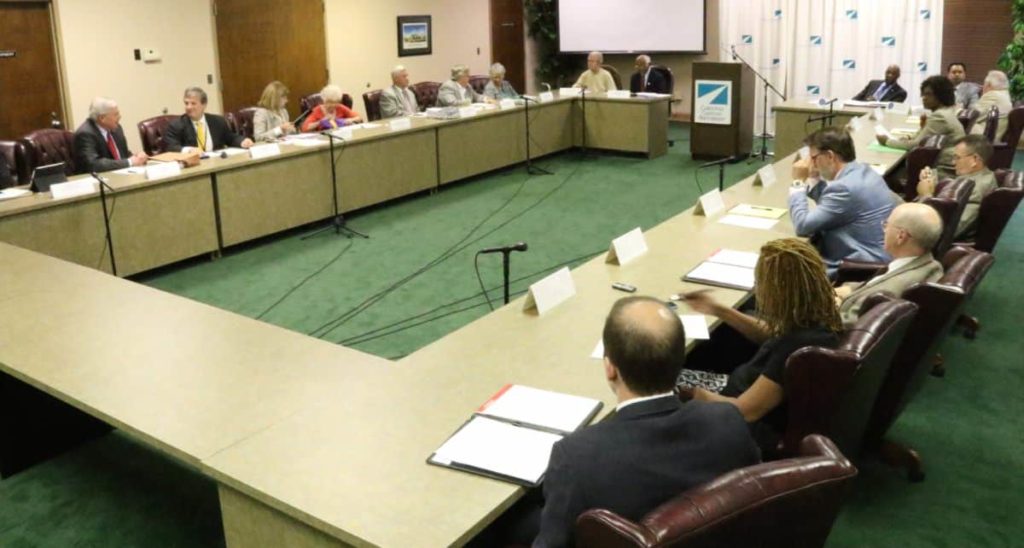
In 2016, the Nash County Board of Commissioners voted to pursue legislation for a county-line demerger to send the roughly 1,800-2,000 students who lived in Edgecombe County but attended Nash-Rocky Mount Schools to Edgecombe County Public Schools (ECPS).
The City of Rocky Mount, the Edgecombe County school board, and the Nash-Rocky Mount school board all opposed this measure, with some saying the move was racially motivated.
Davis and Wayne Outlaw, a Republican Nash County commissioner who was on the Board in 2016, both oppose that perception.
“It was never about race. It was always about funding,” Outlaw said. “It’s always been a concern of mine, that this funding be fair and equitable. That was our total motivation.”
However, Fred Belfield, a Democrat on the Nash County Board of Commissioners who is Black, said there probably is some truth to the idea that race played a factor in the 2016 legislation.
Edgecombe County Board of Commissioners Chair Leonard Wiggins also said the demographics of the students who would be impacted by the county-line demerger make it about race.
“Ninety-nine percent of those students are Black,” Wiggins said. “To me, that makes it about race. [A demerger is] going to make Nash a whiter system, and ours will be more Black.”
Edgecombe County Board of Education Chair Reverend Raymond Privott agreed.
“Everybody knows that’s common knowledge that all of those kids, they are African American kids,” Privott said. “They would never tell us that, but we know that there’s a racial and economic, social underlying cause, a reason for that. I’m Black and I know.”
According to data from the state Department of Public Instruction, Edgecombe County Public Schools had 5,347 students in the 2021-22 school year, 57% of whom were Black, 26% white, 12% Hispanic, and 4% two or more races. In the same school year, Nash County Public Schools had 14,222 students, 53% of whom were Black, 28% white, 14% Hispanic, and 4% two or more races.
At Tuesday’s joint meeting, ECPS shared data from the Office of Civil Rights from 2017 that shows that all four schools on the Edgecombe County side of Rocky Mount have student populations that are between 93-96% Black.

Preserving Nash-Rocky Mount Schools, for now
Edgecombe County Schools and the City of Rocky Mount fought against legislation splitting Nash-Rocky Mount Schools by county line. In the spring of 2016, the two Boards of Commissioners had several meetings to try to hash out an agreement.
They ended up with an agreement that became Senate Bill 382. Signed into law in 2016, the legislation kept the Nash-Rocky Mount school system together but shifted the responsibility of paying both capital costs and the “gap funding” to Edgecombe County starting July 1, 2020.
Here’s what the legislation says:
- Edgecombe County will continue to pay their local per-pupil allotment for the students who attend Nash-Rocky Mount Schools and live in Edgecombe County.
- Starting July 1, 2016, Edgecombe will pay Nash a “proportional share” of all capital expenses, which is determined by the percentage of students enrolled in Nash-Rocky Mount Schools who live in Edgecombe County.
- Starting July 1, 2020, Edgecombe County will take over from the City of Rocky Mount funding the gap between Edgecombe’s local per-pupil allotment and Nash’s local per-pupil allotment for the students who attend Nash-Rocky Mount Schools and live in Edgecombe County.
- Starting July 1, 2020, Nash-Rocky Mount Schools will be renamed “Nash School Administrative Unit,” and the Nash-Rocky Mount Board of Education will become the Nash Board of Education.
- A local board of education cannot file any legal action against the Nash County Board of Commissioners challenging the sufficiency of funding for 10 years.
The legislation sets it up so that if Edgecombe County fails to pay either the capital costs or local per-pupil allotment, this will automatically trigger a county-line demerger where all students who live in Edgecombe County and attend Nash County Public Schools will be transferred to ECPS.
The bill passed unanimously, a fact that both Davis and Outlaw highlighted as evidence that both sides were satisfied with the agreement. However, former Democratic state senator from Rocky Mount Angela Bryant said she vehemently opposed the bill but voted for it because it was better than the alternative, which would have been the county-line demerger.
“We had to vote for it to get the negotiation, the settlement, but we opposed the whole effort,” Bryant said. “We thought the whole issue was bogus and could have been resolved without legislation.”
Reconsidering the path forward
In July 2020, Edgecombe County started paying the gap funding to Nash County.
“We had to budget an additional $470,000 to make up that gap,” said Edgecombe County Manager Eric Evans. “We are paying more per student for 1,600-1,700 students in Nash County Schools than we are here in Edgecombe.”
In the 2020-2021 school year, Edgecombe County’s local per-pupil expenditure was $1,202.66 compared to Nash County’s local per-pupil expenditure of $1,589.35. For this upcoming school year, Edgecombe County will have to pay Nash County $552,132.11, Evans shared at Tuesday’s joint meeting.
Since 2016, Edgecombe County also has had to pay their proportionate share of capital costs, about 11-12% according to Evans, for any projects in Nash County. That includes debt service on the $32 million Rocky Mount High School and a new elementary school under construction in Red Oak with a price tag of $20 million.
“Starting this year, we had to budget $125,000-$130,000 for our share of debt service for [the Red Oak elementary school] where it is likely that zero students who live in Edgecombe County will set foot,” Evans said.
Since 2018-19, Edgecombe County has paid Nash County $2,156,066 in capital costs and is projected to pay another $466,390 this year.
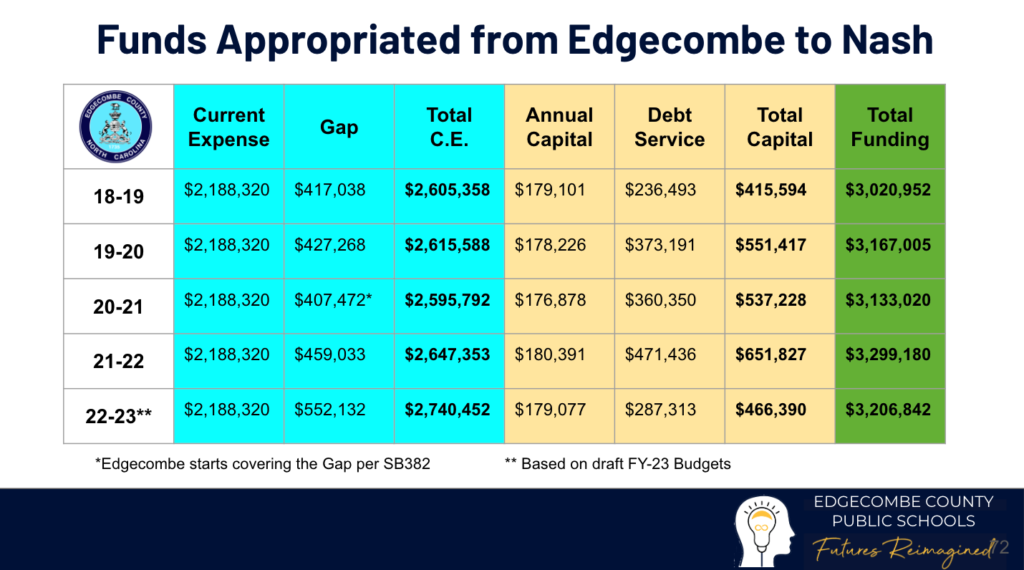
Over the next few years, Davis said Nash County is looking at building a new field house in northern Nash and a new middle school in southern Nash, both areas of the county outside of Rocky Mount.
“We have maybe two board members on their school board that represent our county. We do not get a vote on their budget, so when we send our money over there, they do what they want with it. We can’t question what they do,” Edgecombe County Board of Commissioners Chair Leonard Wiggins said.
“That statute backed us in a corner,” Evans said.
Wiggins also pointed to the academic performance of the four schools on the Edgecombe County side of Rocky Mount — Baskerville Elementary, DS Johnson Elementary, Fairview Elementary, and JW Parker Middle– and said he doesn’t think Nash County is doing a good job educating those students or maintaining the facilities.
“It’s my understanding that those schools are failing,” Wiggins said. “It’s also my understanding from talking with the Nash County Commissioners that they are not going to put any money in capital improvement. Based on those conversations, those buildings will never be fixed.”
In 2019, the last year before COVID-19 disrupted schools and end-of-grade testing, the four Nash-Rocky Mount Schools on the Edgecombe County side all received school performance scores of F from the state Department of Public Instruction. Of the four schools, only DS Johnson met academic growth in 2019.
“We do the children of east Rocky Mount a disservice if we do not demerge,” Wiggins told the Edgecombe County Commissioners at their retreat in March 2022. “Those are our kids.”
Weighing these issues, Edgecombe County Commissioners approved funding for a new position to study and explore a potential demerger. The district hired Donnell Cannon, the former principal of North Edgecombe High School, as the executive director of district transformation and redesign to lead this work.
During Tuesday’s joint meeting of the Edgecombe County Board of Commissioners and Board of Education, ECPS director of maintenance Jerome Williams said between the four schools, there is approximately $8.7 million in deferred maintenance costs, a number that is based on a 2016 Facility Needs Survey from the Department of Public Instruction and includes upgrades Nash County made to the four schools from 2015 to 2019.
Williams also shared that Edgecombe County Public Schools has about $9 million in deferred maintenance costs on its existing schools right now.

Exploring a demerger
Starting in July 2021, Cannon began exploring what a demerger could mean for ECPS and the families and students living on the Edgecombe County side of Rocky Mount.
ECPS has a history of innovative projects, leading Superintendent Dr. Valerie Bridges to be named North Carolina’s 2022 Superintendent of the Year. So it comes as no surprise that, when given the task to figure out how to bring 1,600-1,700 students into the district, Bridges, Cannon, and Assistant Superintendent of Innovation and Strategic Planning Erin Swanson are thinking creatively.
“As a school system, we are really determined to be innovative, and it’s not just a cute word. We’re serious about it. We want to create opportunities for our students,” Bridges said.
Cannon shared that they are using human-centered design to learn what students and families want from their education.
“We ask questions like: What’s working for your school? What do you want more of? What do you want less of? And we start to consider all of these insights as part of our design,” he said.
“What we found out is no one had had a conversation with these families,” Bridges said. “It’s going to happen to you, but no one is talking to you about it. That’s not a good feeling.”

Cannon met with anyone who would talk to him — parents, grandparents, caregivers, business owners, and kids who live on the Edgecombe County side of Rocky Mount — conducting what ECPS calls empathy interviews, or “conversations to understand the feelings of others and their lived experiences in and outside of school,” according to Cannon.
As of May 18, 2022, he has done 140 of these empathy interviews.
Cannon and other ECPS staff have also been doing inspiration visits across the country. They have completed 12 visits so far.
“We are always learning and always looking to get better,” Cannon said at a May 2022 community meeting on the demerger. “A parent may say, ‘Hey, my kid loves to doodle in math class, but she doesn’t have opportunities to build that passion and that skill. So then we’ll ask the question… what schools, what communities, what school-adjacent organizations are doing this well, and how might we learn from them?”
For example, after hearing from parents and students about the desire for arts education, Cannon visited Sallie B. Howard School of Arts and Sciences in Wilson, a charter school that was recently named a National Blue Ribbon School for 2021.
In March 2022, EdNC joined a group organized by Cannon, including Superintendent Bridges and other ECPS leaders, ECPS Board Chair Rev. Privott, Rocky Mount Mayor Sandy Roberson and City Councilman T.J. Walker, and a Rocky Mount parent to visit two schools in New York City, the Brooklyn STEAM Center and Fannie Lou Hamer Freedom High School, that are rethinking high school education.

Cannon put together a design team made up of educators, parents, students, and community members to help ECPS think through different options if the demerger occurs. The group will meet for the third time in June.
And, after receiving feedback from Edgecombe County Commissioners in March, ECPS held three community meetings in Rocky Mount this May to get feedback from community members.
Cannon said they did not experience significant opposition to the demerger at the meetings. Instead, they saw both in the meetings and in survey results curiosity around the issue and a desire to be included in the decision making. He also highlighted that community members want to keep students in their current schools.
A new vision for east Rocky Mount
Taking what they’ve learned through empathy interviews, inspiration visits, and feedback from community members, ECPS is building a model for bringing the 1,600-1,700 Rocky Mount students into their school system.
At a joint meeting of the Edgecombe County Commissioners and Board of Education in February 2020, ECPS presented several options for how the system could absorb these students, including busing students to existing ECPS schools that have extra capacity.
However, during his empathy interviews, Cannon heard that families want their students to remain in their neighborhood schools in Rocky Mount. So, the district is now looking at the conditions at the four schools in east Rocky Mount and trying to project how much it will cost to make the necessary capital improvements to keep students in those four schools.
The four schools include two elementary and two middle schools, but there is no high school located on the Edgecombe County side of Rocky Mount. Cannon has come up with a model for 7th through 12th grade students that would involve renovating the historic post office in downtown Rocky Mount and partnering with Edgecombe Community College across the street to create five microschools:
- 7th-8th grade microschool
- Health Sciences Early College (pending approval from the General Assembly)
- School of Engineering and Advanced Technology
- School of the Arts and Design
- School of Entrepreneurship and Innovation
Students would have a shared home base in downtown Rocky Mount, such as the post office, but each microschool would also have its own building. Students would have individual learning plans and advisors and mentors that would loop with them each grade. They would spend part of their weeks learning in internships, and the goal would be for each student to graduate college and career ready with at least one credential or certification.
“We know our kids are all different in so many ways,” Cannon said, “so we want to design schools that are not just cookie cutter but schools that design for the one kid. We came up with five different microschools that can support the myriad of passions that kids have and the myriad of purposes that kids say they want to pursue.”
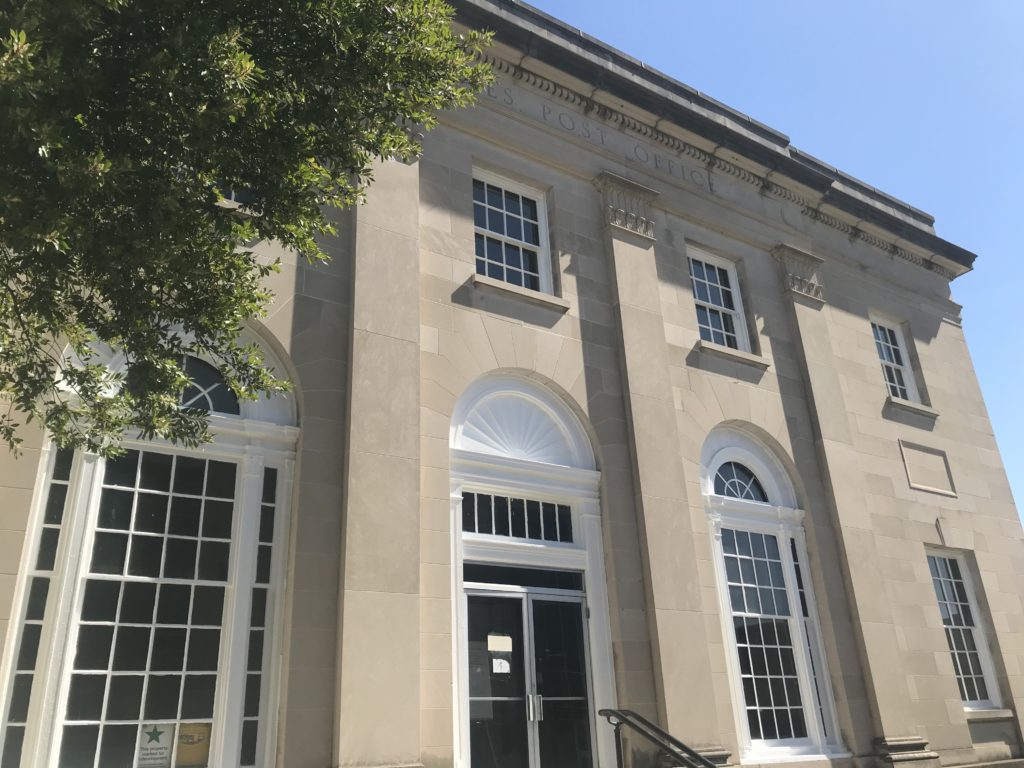
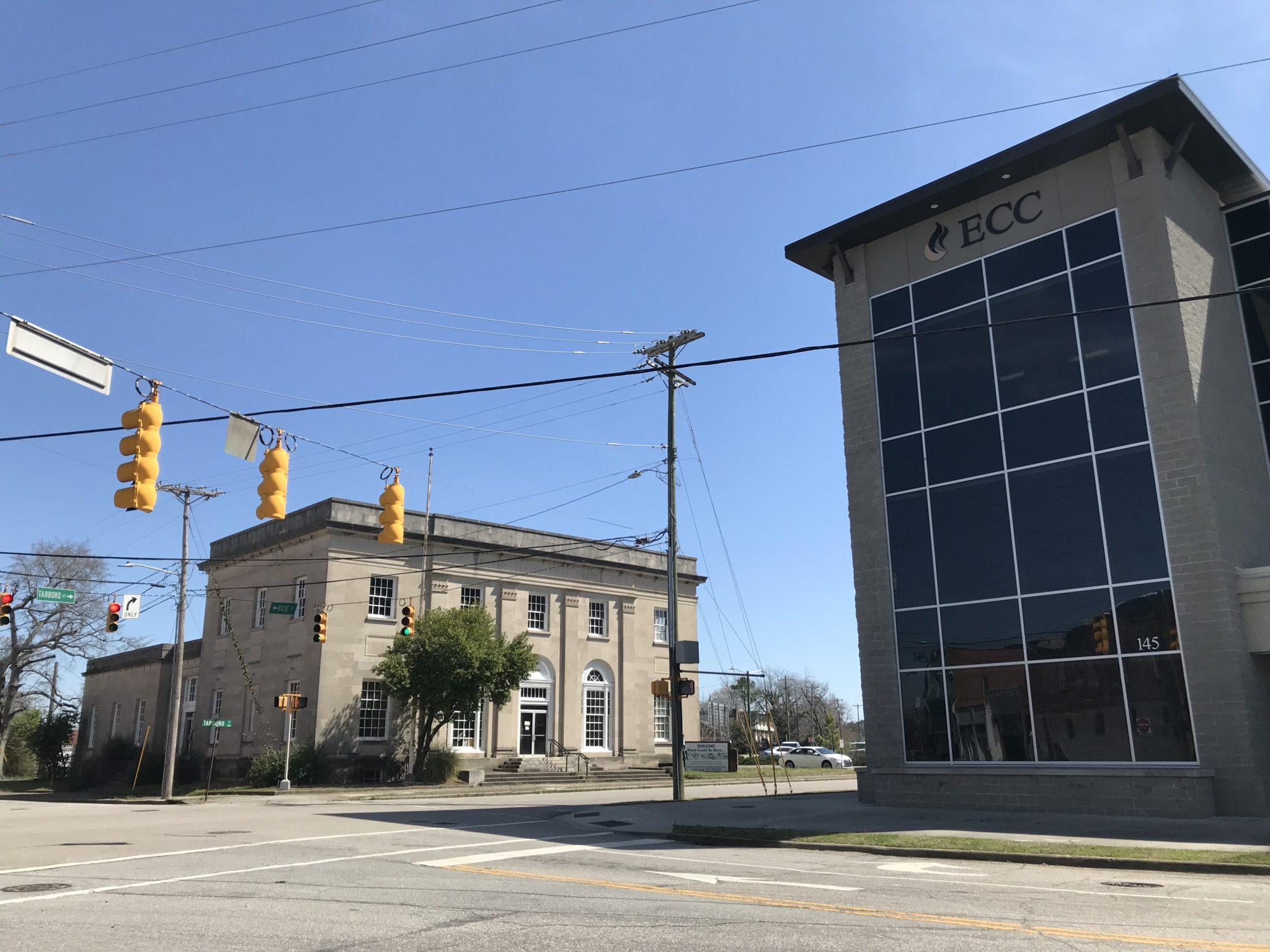
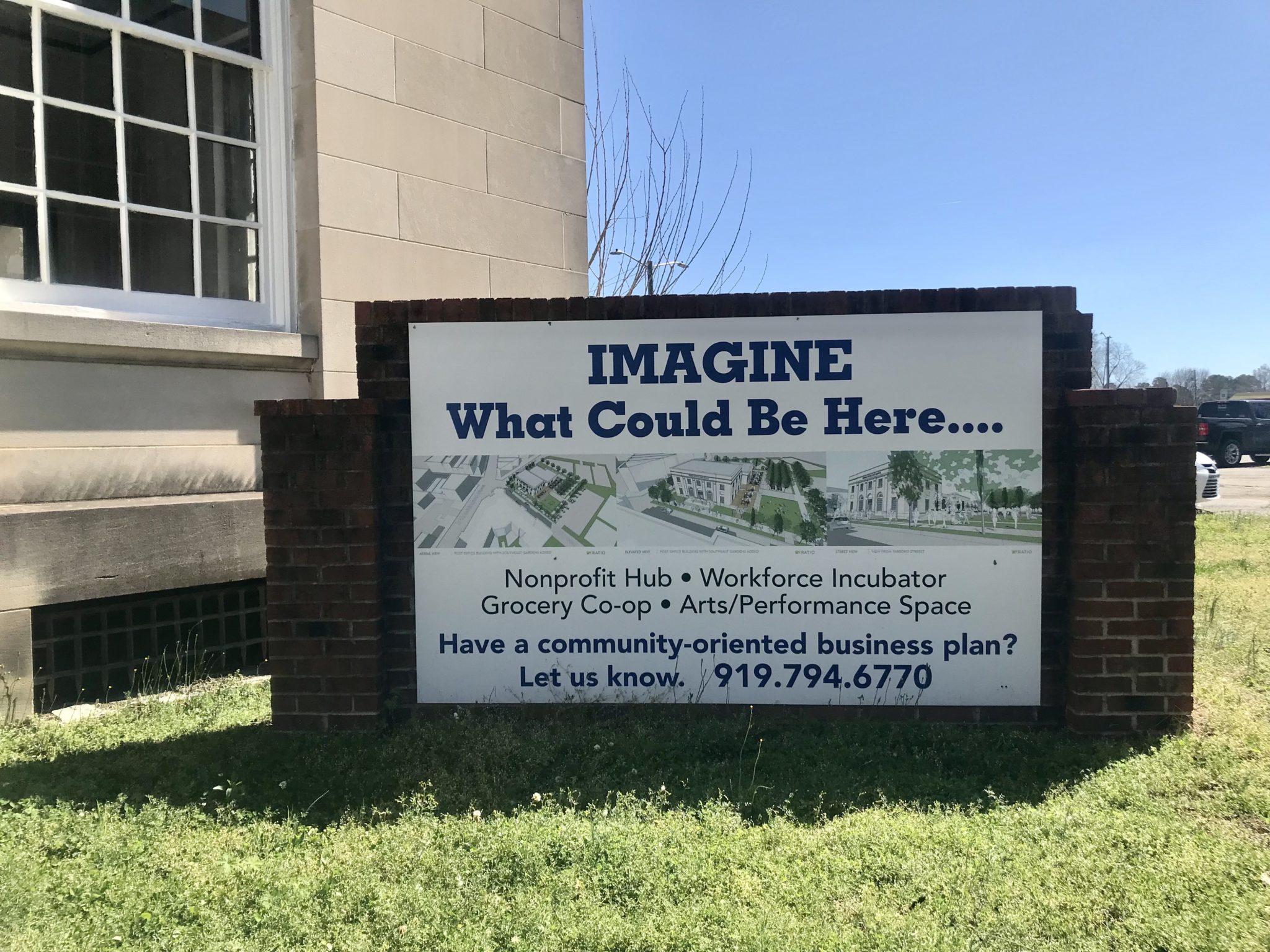
Wiggins said if the Edgecombe County Commissioners vote to pursue the demerger, he’s not ruling out building a new high school in east Rocky Mount. However, this plan would allow ECPS to move forward on a faster timeline than building a new high school from the ground up.
At Tuesday’s joint meeting, Williams said the average cost of building a new high school in 2020 was $43 million for a 369,636 square foot building, according to the Department of Public Instruction. Due to inflation, however, that cost could rise 10%, he said. The cost of purchasing and renovating the downtown post office would be around $7.75 million, which Williams said could also increase 10% due to inflation.
Both Cannon and Wiggins said that if the demerger happens, they will ask that Rocky Mount high school students be able to finish out their high school term at their current schools.
For the younger grade levels, Cannon said their model would have a deep focus on literacy and math development, experiential learning in the community, and instruction in compassion, empathy, and self-regulation.
Cannon said their model will focus on supporting students and families from birth onward with a focus on early brain development. He said they are exploring what it could look like to have an “early learning doula” that would walk parents through the learning milestones that their child needs to hit to prepare for kindergarten. Cannon also said they are looking at funding opportunities for pre-K for three- and four-year-olds.
Another feature ECPS is exploring is an alternative pathways school for students as early as third grade to early adulthood.
“We realized that school does not work for every child, and so we want to create models that better work for children,” Cannon said.
The alternative pathways school would include personalized learning plans, internships, alternative assessments, virtual and hybrid options, GED and ESL class offerings, and have flexible scheduling between the morning, afternoon, and evening.
“We’re thinking big and bold about what this could look like and what this could be,” Cannon said.
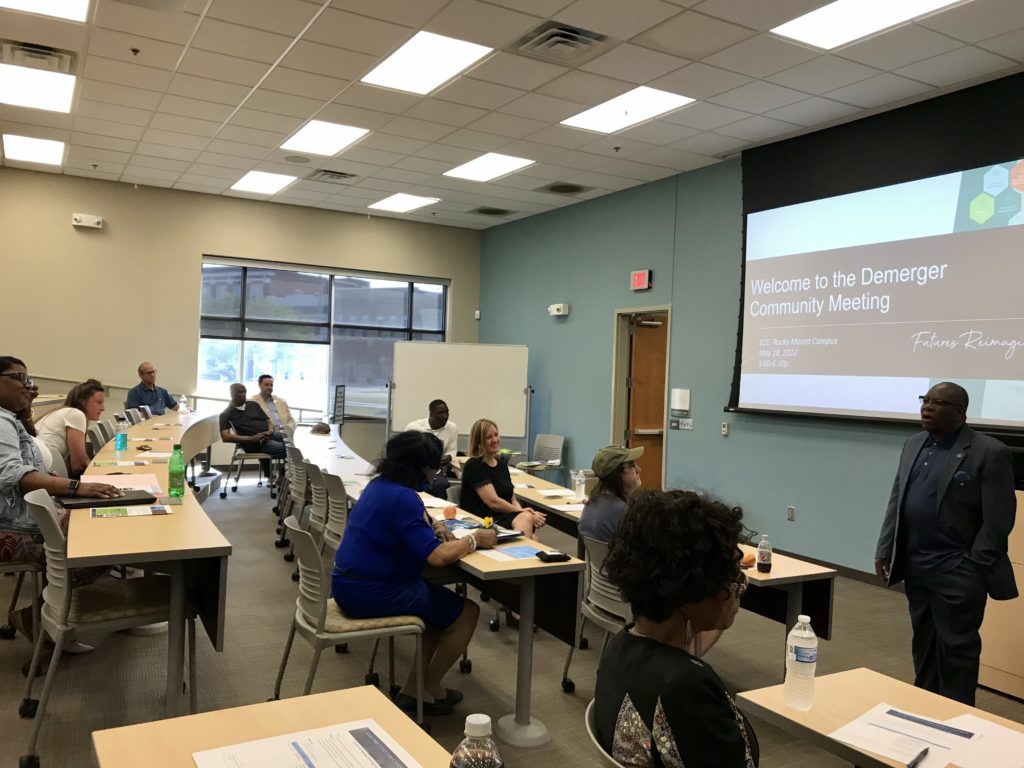
What comes next?
Wiggins said he will ask his board for a vote on the demerger in the next 90 days.
If they do vote to pursue a demerger this summer, it will not happen immediately. Wiggins said they will set a date two years out to give both school systems time to plan for the transition.
If they do vote to demerge, there will be significant impacts on both school systems.
At Tuesday’s joint meeting, Edgecombe County Commissioner Donald Boswell raised concerns that a demerger would further divide the city of Rocky Mount.
“If we demerge, you’ve hit the last nail in the coffin to separate this city,” Boswell said, to which Wiggins responded, “SB 382 (the 2016 legislation) drove the nail in and put us in this position.”
Rev. Privott says he thinks the biggest challenge is going to be changing mindsets.
“There’s no question about it,” he said, “there’s some mindsets over in the Nash area that we’re the stepchildren as far as education is concerned, and that’s not true, but people look at it that way. We’ve got to change some mindsets, and we’ve got to do some groundwork in educating people as to what we’re about, where we’re headed, what we can offer.”
Edgecombe County will need to invest in capital improvements at the four Rocky Mount schools and downtown spaces that would host the microschools.
“I think the biggest issue that we have would be capital improvement funding and new school money,” Wiggins said. “We would be looking for help from state and federal, seeking funds from any source that we could.”
Dr. Bridges and her team will then have to determine staffing and curriculum needs for those schools. While the 2016 legislation says the buildings and students will transition to ECPS in a demerger, it doesn’t say anything about the staff.
“What we’re not going to say is that those teachers will automatically become ECPS employees,” Dr. Bridges said. “I have to select the best educators … the educators who are going to dream with and for our students. That’s who we are selecting.”
One other consideration for hiring former Nash county educators is pay. Currently Edgecombe County pays a local teacher supplement of 7% compared to Nash County’s base supplement of 10%. If Edgecombe does not raise that supplement, Nash County educators will face a pay cut if they want to teach in Edgecombe County.

Nash County Public Schools, on the other hand, will face a significant loss in funding. The majority of the students who would transition to ECPS qualify for federal Title I funding, which would go to ECPS if the demerger occurs. According to data ECPS shared at Tuesday’s joint meeting, Nash County received $472,117 in federal Title I funding in 2021-2022.
“We’re going to lose a ton of revenue,” Nash County Commissioner Chair Robbie Davis said.
Both counties will also have to redraw their school board lines and hold new elections if the demerger happens.
Despite these challenges, both Wiggins and Privott are excited about the opportunity and believe now is the right time to make the move.
“It’s a great opportunity for all of our children — those who are here and those who are now attending the Nash County Public Schools but will attend our system in the future whenever that time comes,” Privott said. “Now is the time to look at the possibility of reinventing what education really looks like as far as ECPS is concerned.”
Wiggins said the biggest opportunities he sees if the demerger moves forward is more community and parent involvement and pride in their schools.
“They’ll be our schools,” he said.
As for Dr. Bridges and her team, she said the most important thing is the students.
“We want to make sure that we get it right,” she said. “That our students, our homecoming students, have opportunities that will fulfill their dreams. How do we make sure that we as the adults have provided the opportunities that they need in order to be successful?”
How can you weigh in?
If you live in Rocky Mount and will be directly impacted by the proposed demerger, take this survey from ECPS. You can also email Donnell Cannon at dcannon@ecps.us to set up a meeting.
Editor’s note: Donnell Cannon serves on EdNC’s Strategic Council.



